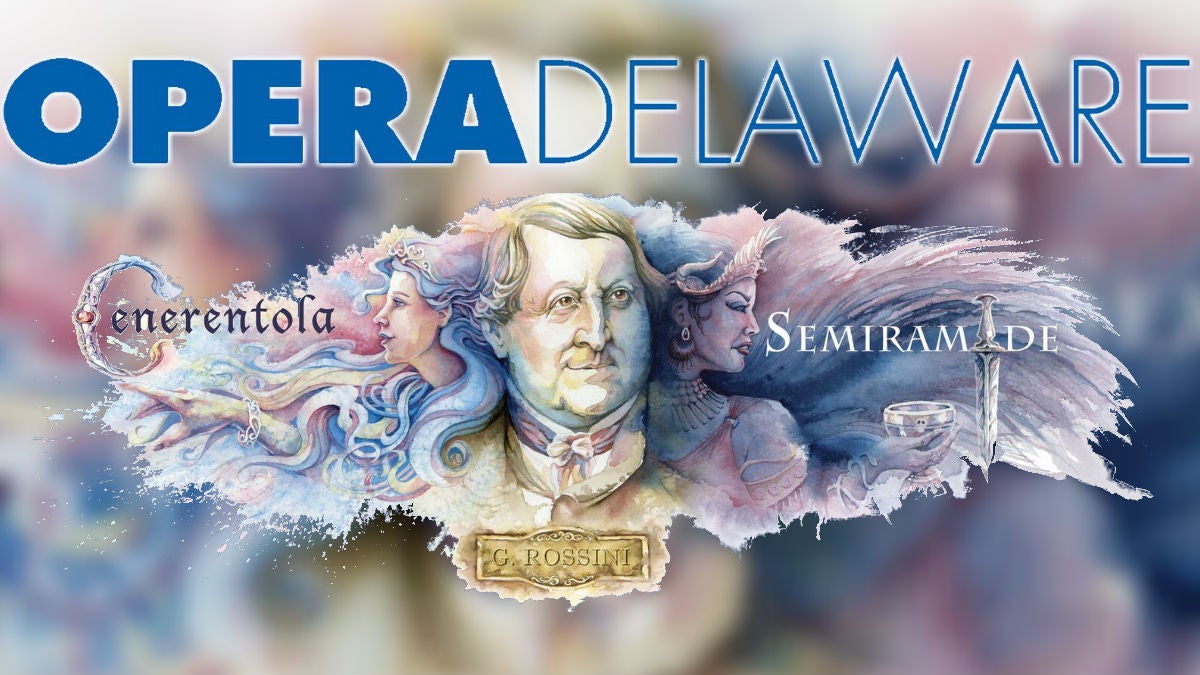OperaDelaware presents Rossini’s rare and familiar at Spring Festival

(image courtesy OperaDelaware)
OperaDelaware celebrates the 225th anniversary of the birth of Gioachino Rossini with festival performances this Saturday and Sunday and next weekend.
Legend has it that in 1822 a young and wildly successful Gioachino Rossini succeeded in meeting Ludwig von Beethoven, then 51 years old, deaf, cantankerous and in failing health. Communicating in writing Beethoven commented: “Ah, Rossini. So you’re the composer of ‘The Barber of Seville.’ I congratulate you. It will be played as long as Italian opera exists. Never try to write anything else but opera buffa; any other style would do violence to your nature.”
As it happens, Rossini was even more widely recognized during his lifetime for his serous operas which, in recent years, have received the same attention from scholars, record companies and opera houses that had been accorded the works of Bellini, Donizetti and Verdi.
OperaDelaware will celebrate the 225th anniversary of the birth of this multi-faceted musical genius with productions of his popular setting of “Cinderella” (“La Cenerentola”) and the rarely-performed tragedy “Semiramide,” Rossini’s last Italian opera.
The festival runs April 29 and 30, May 6 and 7 with afternoon and evening performances of both operas. In addition, a performance of Rossini’s Petite messe solennelle will take place on Friday evening, May 5. All performances will be held at The Grand Opera House in Wilmington.
OperaDelaware General Director Brendan Cooke said the decision to stage a Rossini festival grew in part out of the success of last year’s production of “Amleto” and the company’s collaboration with musicologist/conductor Anthony Barrese. “Given Maestro’s passion for the repertoire, it seemed to have an out-of-the-way Rossini opera would be a project Maestro would want to work on and one that we could get excited about,” he said.
“Semiramide,” from 1823, is one of Rossini’s finest achievements. Based on the Voltaire tragedy, “Semiramis,” it recounts the love triangle between Semiramide, the Queen of Babylon, an evil prince and a young man of whom Semiramide is at first enamored but who turns out to be her son.
Opportunities to savor the drama on stage—while increasing—remain rare especially in America. As with other Rossini operas, finding voices with both power and agility can be tough. Staging the opera at The Grand has helped in that respect.
“We’re really fortunate with this opera house,” said Barrese. “The Grand seats just over 1,000. The original Fenice where Semiramide was produced had about 800 seats. One reason why [“Semiramide”] is not done more in America is that American opera houses are bigger and you need bigger voices and you run into that agility problem.”
Another challenge is the sheer scope of the opera itself. “I think for me the special challenges were finding the cuts,” said Barrese. “We have to cut it down because the original was six hours long with a ballet in the middle. Even four hours is too long. I spent months getting the cuts down to get it under three hours and do things that are historically accurate and that would not disturb the architecture of the piece.”
The cast is excited about the opportunity to perform the work on stage and in costume. Earlier this month, they performed the work in concert at the Baltimore Concert Opera.
“I think it will be really exciting to see it on stage because this is a dramatic grand opera of Rossini’s and it’s really enhanced by the amazing sets and the amazing costumes that we have,” said soprano Lindsay Ohse, who sings the title role of Queen Semiramide.
Baritone Daniel Mobbs, who sings the role of Assur, says the movement required for a staged production allows for better vocal production and character delineation. “When I’m singing in my favorite tux, I feel like me,” he said. “When I’m in full beard and robes I feel more like Assur and it’s more natural.”
Ohse and mezzo-soprano Aleksandra Romano are excited about blending their respective vocal types in their duets, a rare combination in the world of opera. “We sing in very close harmonies so you get all the colors of the female voice at once,” said Romano, who sings the trouser role of Arsace.
“Cinderella” (“La Cenerentola”) from 1817 is a dramma giocoso—literally drama with jokes—based on the time-honored fairy tale. But in this variation, the wicked stepmother is replaced by a wicked stepfather. The fairy godmother is replaced by a philosopher. Cinderella is identified not by her glass slipper but by a bracelet. But there are still wicked stepsisters, a carriage and an enchanting happily-ever-after ending.
“The magic in our production an in “La Cenerentola” in general is the magic of humanity, the magic of forgiveness, the magic of goodness,” said director A. Scott Parry. “The secondary title is goodness triumphant and that is actually said a number of times in the opera and that’s where we’re going to put the eggs in our basket.”
Mezzo-soprano Megan Marino who sings the title role agrees. “I’ve sung the role five times and each time, regardless of credo or political persuasion, the thing about Cinderella is goodness triumphs,” she said.
“Throughout the whole show she’s this sacrificial lamb, but in the end she forgives. It’s an amazing example of how to be.”
She also likes the way the music is written for her character. “There are lots of tender moments and lots and lots of decoration,” she said. “There’s a lot of virtuoso writing that Rossini usually reserves for his serious operas.”
Parry notes that while the opera is comic, it’s not slapstick but rather a comedy of errors and manner and one that has a broader message for society. “Let’s not simply turn our backs on those in our world that perhaps have something more to offer if they were only give a leg up or a chance to succeed,” he said. “Who knows what their possibilities or potential would be. With Cinderella no one thought she was anything and yet here she is, she ascends the throne.”—-If you go:What: Opera Delaware, Rossini Festival 2017Where: The Grand Opera House, 818 N. Market Street, WilmingtonWhen: April 29 and 30; May 6 and 7; May 5 Petite messe solennelleFor information on times and to purchase tickets, visit www.operade.org
WHYY is your source for fact-based, in-depth journalism and information. As a nonprofit organization, we rely on financial support from readers like you. Please give today.




